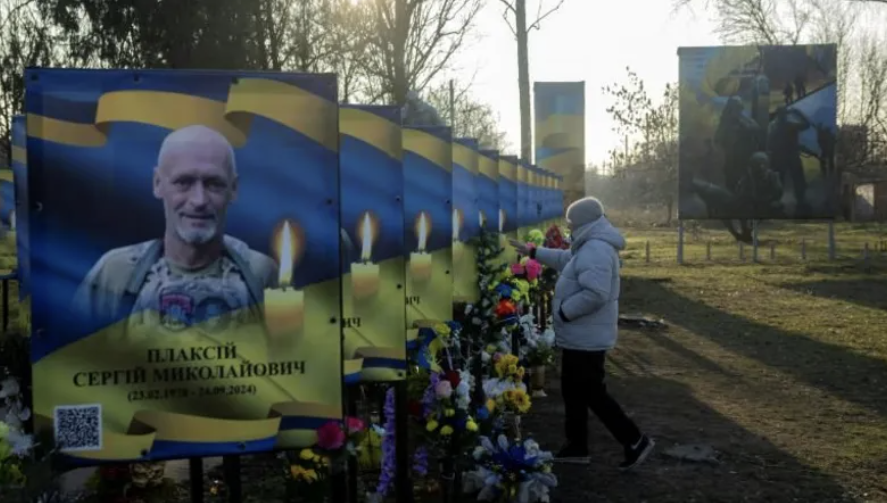

President Donald Trump has announced that US, Russian and Ukrainian officials will meet at a security conference in Munich on Friday for talks on how to end the war in Ukraine.
"Russia is going to be there with our people," the US president said. "Ukraine is also invited, by the way, not sure exactly who's going to be there from any country - but high-level people from Russia, from Ukraine and from the United States."
However, Russia - which is not officially attending the annual forum in Germany - did not comment and a senior Ukrainian official said "talks with Russians in Munich" were "not expected".
America's Nato allies are still reacting to Trump's surprise announcement this week that he and Russian President Vladimir Putin had agreed in a phone call to begin talks to end the war.
Zelensky is also expected to meet US Secretary of State Marco Rubio.
Rubio's plane had to turn back to a US airbase in Maryland late on Thursday, after it experienced a "mechanical issue" on its way to the German city. He was then due to take a different plane.
The US president announced the three-way meeting in Munich during a press conference on Thursday, without giving any further details.
However, Zelensky adviser Dmytro Lytvyn told reporters the Ukrainian delegation had no plans to attend such a meeting.
Russia did not immediately respond to a BBC request for comment on the issue.
Trump's announcement came a day after he held separate phone calls first with Putin, then with Zelensky.
Describing the talks as "great", Trump said there was a "good possibility of ending that horrible, very bloody war".
But he said it was not "practical" for Kyiv to join the Nato military alliance and also "unlikely" that Ukraine could return to its pre-invasion borders in 2014.
Zelensky - who admitted it was "not very pleasing" that Trump had spoken to Putin before him - warned that Ukraine would not agree to any peace deal proposed by the US and Russia without Kyiv's involvement.
"We cannot accept it, as an independent country," he said, stressing that his priority was "security guarantees", something he did not see without US support.
Zelensky said European allies "needed to be at the negotiating table too", amid growing fears across the continent that Trump's overture to Putin could lead to a separate US-Russia deal on Ukraine's and Europe's future.
French President Emmanuel Macron told the Financial Times that only Zelensky could negotiate on behalf of his country with Russia, warning a "peace that is a capitulation" would be "bad news for everyone".
EU foreign policy chief Kaja Kallas said: "Any quick fix is a dirty deal."
In Munich, Zelensky's goals in his meeting with Vance seem clear: to encourage the US to continue to stand by Ukraine and keep the beleaguered nation's best interests in mind as it tries to negotiate an end to the war.
What the Americans want from this meeting is more uncertain. Vance may try to assure Zelensky that the Ukrainians will be involved in the forthcoming peace negotiations, even if lately it seems as though they will be a junior partner.
Vance, in fact, may be delivering a blunt message - one that Defence Secretary Pete Hegseth said publicly on Monday, even if he later walked it back somewhat. The US does not envision a Nato that includes Ukraine. And in order to end the war, Ukraine will have to give up territory that is currently under Russian control
It may be a bitter pill for Zelensky to swallow, but the kind of additional US military aid to Ukraine that it eventually would need to keep up the fight seems unlikely at this point.
Neither Trump nor Trump's Republican Party in Congress have much interest in keeping the support going.
Following the overthrow of Ukraine's pro-Russian president in 2014, Moscow annexed the Black Sea peninsula of Crimea and backed pro-Russian separatists in bloody fighting in eastern Ukraine.
The conflict burst into all-out war when Russia invaded Ukraine nearly three years ago.
Moscow's attempts to take control of the capital Kyiv were thwarted, but Russian forces have taken around one-fifth of Ukraine's territory in the east and south, and have carried out air strikes across the country.
Ukraine has retaliated with artillery and drone strikes, as well as a ground offensive against Russia's western Kursk region.
Accurate casualty counts are hard to come by due to secrecy by both the Russian and Ukrainian governments, but it is estimated that hundreds of thousands of people, most of them soldiers, have been killed or injured, and millions of Ukrainian civilians have fled as refugees.


